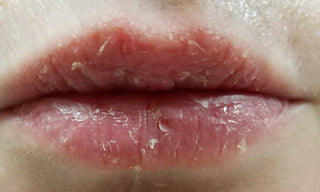Innovative Non-Toxic Skin Healing Solutions

by Dr. Nasimeh Yazdani and Dr. Stacy Matthews Branch
Your lips are an important feature of your face that help you articulate words, sense foods, and serve as an erogenous zone. They are especially sensitive organs containing triple the nerve receptors than other parts of the face. That explains why kissing feels so good, and why aesthetic procedures such as lip fillers hurt much more than other areas of the face. Healthy lips appear shiny, slightly pinkish and have a smooth and soft surface, as opposed to dry, flaky, damaged lips. You may be familiar with the term dermatitis or eczema, which describes any inflammation of the skin whether it is due to an infection, trauma, or a chronic condition. One cause of eczema is atopic dermatitis localized on the lips. Features of lip eczema include scaling of skin, itching, redness, skin thickening, and dryness. It's having chapped lips all the time.
The Immune System Behind Lip Eczema
The skin has many protective layers, and when the top layers’ barrier is damaged or when small particles enter the immunogenic layer, a host of physiologic reactions take place to protect you from harm. Whether it is a cosmetic ingredient or poison ivy, if the skin perceives it as a harmful substance, then it will process antibodies or other types of immune cells, ie T cells against that substance. Upon subsequent exposures, the fired up immune cells release inflammatory chemicals in an attempt to neutralize the invading substance, and a dermatitis reaction takes place. Depending on the toxicity of the substance, such as poison ivy where only one exposure can elicit the reaction, other seemingly benign ingredients, found in various cosmetics and skincare may require repeated exposures before the immune system responds.
Environmental Triggers Commonly Associated with Lip Eczema
How Not to Treat Lip Eczema
Various compounds are used to provide temporary relief for people with lip eczema. However, using the wrong product can make the condition worse. For example, a doctor may prescribe barrier creams for eczema on the hands, but these are not ideal for the lip area due to the heavier formulation and oily nature of these creams. And despite its widespread use, topical steroid creams such as hydrocortisone have been shown to thin skin's barrier potency and lead to recurrent episodes of lip eczema. Well described research articles and book chapters recommend against the use of topical steroids for sensitive areas of the face, such as lips.
Over the counter chapsticks or lip balms often contain the same harmful substances which triggered the immune cells in the first place. If your doctor recommends sunscreen protection, avoid oxybenzone containing sunscreens.
It is always best to read skin care product labels carefully to avoid exposure to ingredients that can lead to lip eczema. Be wary of “dermatologists recommended” products which contain sensitizers such as lanolin, parabens and fragrance.
Healing Lip Eczema
Opt for simple, clean ingredients rich in butters to reconstitute the barrier of the broken epidermis and soothe the lips. This will allow your natural healing abilities time to heal. Avoid licking lips repeatedly, reduce stress, stay away from food allergens and cover lip area when in extreme weather. It is important to avoid skin care products and cosmetics that contain common allergens described above. This may mean not wearing lipstick for a while. (I know, this was the hardest part for me).
Non-medicinal methods to relieve lip eczema symptoms can include cool compresses for acute inflammation to suppresses vesiculation. For healing purposes, choose products such as Response Gel with MatrX B which contains natural antioxidants to quicken healing of lip eczema.
1: Schena D, Fantuzzi F, Girolomoni G. Contact allergy in chronic eczematous lip dermatitis. Eur J Dermatol. 2008 Nov-Dec;18(6):688-92.
2. Anthony Du Vivier, Atlas of Clinical Dermatology. Elsevier/Saunders, Dec 12, 2012.
Comments will be approved before showing up.